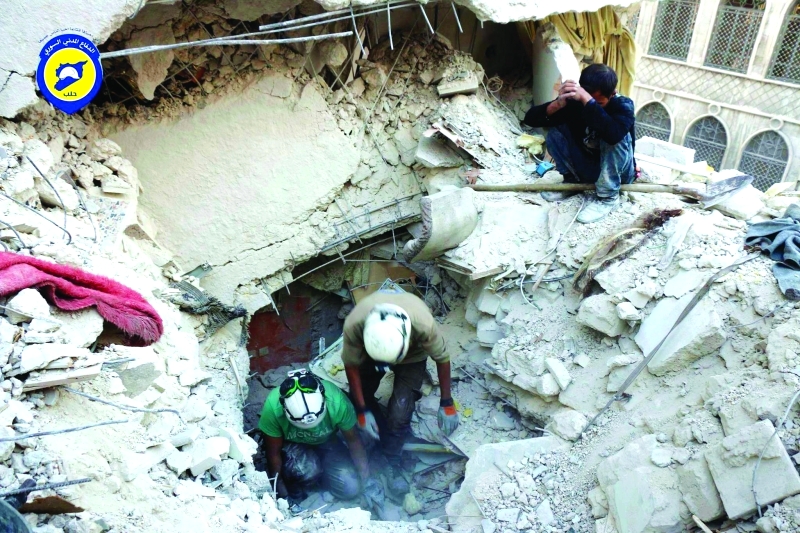The international community should indeed celebrate the safe rescue of 98 members of the White Helmets, but should not abandon those left behind
August 8, 2018

By: Syria Justice and Accountability Center
The July 22 evacuation of 98 members of the White Helmets and their families from Syria has rightly been hailed as a multilateral achievement. Canada, the UK, the US, and Germany negotiated a rescue arrangement with Israel and Jordan to remove the White Helmets and transferring them to Jordan, for future resettlement in Europe. However, hundreds of humanitarian workers and journalists remain trapped and vulnerable to drastic retaliatory measures as the government regains territory in southern Syria. Immediately following the evacuation agreement, the Syrian government denounced the White Helmets, calling them “terrorists” and referring to the evacuation as a “despicable act.” The government’s characterization of these groups could result in their arrest and prosecution under Syria’s 2012 counterterrorism law, which includes broad provisions of what constitutes a “terrorist activity” to include humanitarian assistance and journalism. Syria’s failure to uphold its obligations under international law must be addressed in the UN-sponsored peace negotiations and through the careful monitoring of arrests in areas recently retaken by the Syrian government.
The international discourse surrounding the evacuation operation has shifted focus away from the needs of those still left in Deraa and surrounding areas. More than 300 members of the White Helmets remain trapped in southern Syria, confined to about ten square kilometers. The members who were left behind fear reprisals, concerned that evacuation will incite government efforts to arrest remaining members. The Syrian government allegedly targeted White Helmets operations centers more than one hundred times in 2017 alone, and both Syria and Russia have been blamed for direct attacks on humanitarian convoys and the use of siege tactics to compel surrender. Humanitarian workers are not the only group facing reprisals in southern Syria. Journalists and media activists are also at risk. The Syrian government has called critical reporters and media outlets “the enemy media,” and has allegedly conducted deliberate shelling operations directed towards media communication centers. SJAC’s database includes documentation of over 100 detained individuals who were journalists or media activists and government orders for individuals to be monitored, investigated, or detained for contributing to foreign media, as well as arrest records which resulted from media work.
Syria’s counterterrorism law was deliberately designed to criminalize civilian activities that the state perceives as contrary to its own interests. The law defines terrorism to include activities that cause harm to “the foundation of the state or its infrastructure…..by any means of any tool that serves that purpose.” This has been interpreted to include non-violent activities, demonstrations, or critical journalism. Similarly, Article 8 of the 2012 law includes a provision on “distributing publications or stored information of any form with the intent to promote terrorist means or actions.” Not only could this provision encompass journalism, but also the White Helmets’ social media presence, which includes videos and photos of alleged bombings by the Syrian government. In addition to the 2012 law, Article 285 of the Syrian Penal Code of 1949 includes the phrase “attempting to weaken national sentiment,” and Syrian journalists have been tried and convicted in the past simply for peaceful expression of opinions that differ from the Syrian government.
Syrians who are designated as “terrorist” generally receive few protections. The Counter Terrorism Court hears their cases in accordance with the 2012 law. Numerous international groups have reported on the Court’s lack of concern for due process, including the absence of defense lawyers, lack of training for judges and prosecutors, and an inadequate (often absent) appeals process. Investigations have also found that those awaiting trial often suffer severe physical abuse, and the court frequently uses forced confessions obtained in pre-trial detention to secure conviction. The Counter Terrorism Court must adhere to due process rights for terrorism suspects, but journalists and humanitarian workers should not be subject to the Court’s jurisdiction in the first place.
Under international humanitarian law, journalists and humanitarian workers are protected in situations of armed conflict, provided they do not take active part in hostilities (under international humanitarian law, taking an active part in hostilities includes carrying out acts which directly cause harm to another party in the conflict and actions that inflict death, injury or destruction on protected persons or objects); however, the Syrian government disregards this distinction. Human rights protections also apply to journalists and humanitarian workers, in both times of peace and times of armed conflict. Syria ratified the International Covenant on Civil and Political Rights (ICCPR) in 1976. The ICCPR protects the right to freedom of expression in Article 19, as well as the right to a fair trial (including the right to counsel and the right to an appeal process) in Article 14. Additionally, Syria ratified the Convention Against Torture (CAT) in 2004, which protects against torture and cruel, inhuman or degrading treatment or punishment.
The Syrian government, its international backers, and the UN Special Envoy should uphold Syria’s international human rights obligations to protect those undertaking humanitarian and journalism work and ensure respect for human rights within the Counter Terrorism Court. The international community should indeed celebrate the safe rescue of 98 members of the White Helmets, but should not abandon those left behind; instead, the COI and organizations like SJAC should monitor the situation to hold Syria accountable for violating protection rights for journalists and humanitarian workers.
.
.
